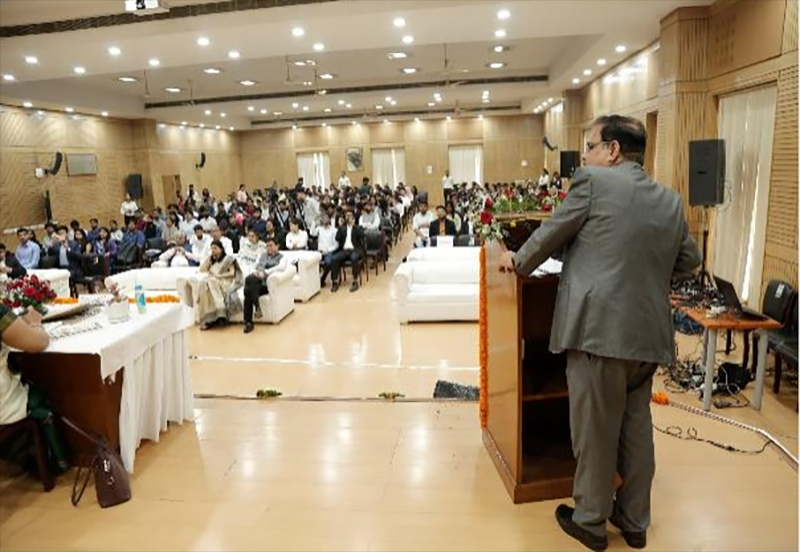 Financial Literacy
Financial Literacy
Investor education is critical for financial inclusion of youth in digital overload era, say experts
New Delhi/IBNS: The Investor Education and Protection Fund Authority (IEPFA), in collaboration with the National Council of Applied Economic Research (NCAER), which is India’s oldest independent economic think tank, and the Department of Commerce, DSE, University of Delhi recently hosted a conference for youth to bolster financial literacy and inclusion.
The conference titled “Investor Education and Protection Strategies in India: Challenges of Modern Times” brought experts from various sectors, such as RBI, Ministry of Corporate Affairs, cybersecurity, regulatory bodies, academics and capital market experts to shed light on critical financial issues and empowerment strategies in today's digital age.
In his address, Prof. Ajay Kumar Singh, Head and Dean, Department of Commerce, Delhi University, underscored the importance of collective efforts in fostering a financially literate and empowered society.
The address set the tone for the day's proceedings, emphasizing the conference's commitment to actionable insights and strategies for financial inclusion of youth. In his address, Prof. Balaram Pani, Dean of Colleges, University of Delhi, highlighted the critical role of investor education in today's fast-evolving financial landscape and called for unified actions to bridge knowledge gaps and ensure equitable access to financial resources and information.
In her message, Ms. Anita Shah Akella, CEO of IEPFA and Joint Secretary in the ministry corporate affairs, emphasized the significance of investor education and protection on the national agenda. She encouraged students to start early with investments to build a brighter and more secure future.
Moderating the discussion, Dr. C S Mohapatra, the IEPF Chair Professor at NCAER, highlighted that the rapid digitalization of financial services, while offering unprecedented accessibility and opportunities, also presents new challenges in this modern era in terms of cyber security, online fraud, and the complexity of modern financial products.
Prof Mohapatra emphasized that the younger generation, who stand on the frontier of the digital finance revolution, needs more attention in terms of education and protection. “Today's youth, as digital natives, are uniquely positioned to leverage the vast potential of fintech innovations, yet they are also at risk from the very complexities and vulnerabilities these technologies introduce,” he said.

He said it is imperative that the strategies framed by regulators not only educate them about the fundamentals of investing but also arm them with critical digital literacy skills. This includes understanding cybersecurity measures, recognizing online scams, and making informed decisions in an environment saturated with information overload and "fin-fluencers".
Dr Mohapatra stated that “by empowering our young investors with knowledge and tools for protection, we are not just safeguarding their individual financial futures but also fortifying the backbone of our economy”.
Lt Col Tushar Anand delved into the microeconomic importance of investor education and protection, emphasizing the initiatives by IEPFA for investor education and the current scenario of claim settlements.
Ms. Suchitra Maurya tackled the complexities of the Grievance Redressal Mechanism, highlighting the significant strides and challenges within the banking sector. She spoke on 3 the evolving landscape of digital banking, coupled with insights on cryptocurrency regulations and Central Bank Digital Currency (CBDC).
Dr. Sanjay Bahl focussed on cybersecurity measures, focusing on government actions and the common pitfalls consumers face in the digital realm. He spoke about the need for a regulatory landscape for "fin-fluencers" and financial apps at a time when lot of Apps-related scams have come to light.
Dr. Ravi Prakash Singh stated that the influx of young investors to the capital market has a profound impact by driving innovation through technology adoption, embracing risk for long-term gains, promoting socially responsible investing, leveraging access to information and education for informed decisions. Concluding the discussion, Mr Sumit Aggarwal, AGM at IEPFA, extended a vote of thanks, acknowledging the invaluable contributions of all the participants, speakers, and attendees.
He lauded the collaborative spirit of the conference, aligning stakeholders towards the shared goal of enhancing financial literacy and safeguarding investor interests.
The Investor Education and Protection Fund Authority (IEPFA) was set up on September 7, 2016, under the aegis of the Ministry of Corporate Affairs, Government of India, for administering the Investor Education and Protection Fund for making refunds of shares, unclaimed dividends, and matured deposits/debentures, among other things, to investors.
Support Our Journalism
We cannot do without you.. your contribution supports unbiased journalism
IBNS is not driven by any ism- not wokeism, not racism, not skewed secularism, not hyper right-wing or left liberal ideals, nor by any hardline religious beliefs or hyper nationalism. We want to serve you good old objective news, as they are. We do not judge or preach. We let people decide for themselves. We only try to present factual and well-sourced news.







